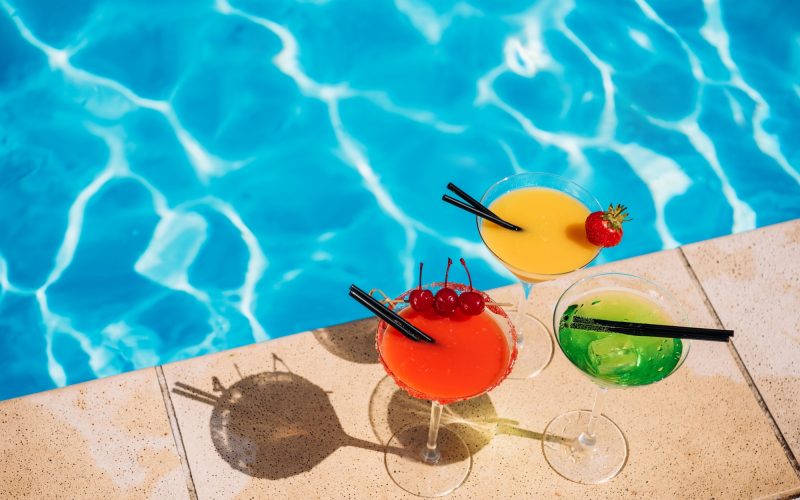Are you looking for creative and delicious ways to enhance the flavor of your next cocktail?
Well, look no further than cherries! This list will discuss different types of cherries for cocktails that you can use.
Cherries are, without a doubt, one of the most popular ingredients in cocktails and other beverages.
But what makes cherries so versatile and ideal for cocktails is that there are wide different varieties you can use to really bring out the flavors and aromas in whatever drink you have in mind.
Adding different types of cherries can create a whole new experience for your drinks.
Whether you are making drinks for one or for a party, there are plenty of great cherry varieties to choose from.
Cherries have been used in cocktails for centuries, but trends in bartending have led to a newfound appreciation for the classic garnish.
From sweet maraschinos to tart kriek lambic, today’s mixologists are increasingly seeking out specialty liquor brandied and fermented cherries that offer distinct flavors that pair well with various liquid ingredients.
If you want to make drinks that stand out on any menu, discover the different types of cherries for cocktails that will give your cocktail an added depth of flavor and texture.
Here is a guide on the diverse selection of cherries available suitable to make delicious cocktails.
1. Maraschino Cherries
Maraschino Cherries are a type of preserved food made with marasca cherries and many other ingredients.
Maraschino cherries, one of the types of cherries for cocktails, have been around for centuries, with the first recorded recipe dating back to the 18th century in Italy.
To make it, fresh cherries are first soaked in a light brine solution before being drained and allowed to dry.
The dried cherries are soaked in syrup to absorb sugar and become plump and juicy instead of bitter and crunchy.
They’re then preserved in alcohol such as brandy or rum for up to six months to develop all the flavors fully.
After this, the liquid is drained away, leaving behind sugary maraschino cherries with a bright red hue and sweet taste, making them popular for desserts and as an edible garnish.
Due to their vibrant coloring, Maraschino cherries are often added to desserts like cakes or cupcakes to give them a burst of flavor and extra decoration.
For example, they’re commonly used on top of ice cream sundaes or layer cakes because they contrast color against pale desserts while improving the taste.
Maraschino cherries can also be found in cocktails such as the Manhattan Cocktail, where they add sweetness with an alcoholic kick which helps balance out any bitter notes from rye whiskey or vermouth.
Despite its popularity, maraschino cherry, one of the types of cherries for cocktails, has caused controversy due to its chemically-processed nature.
Because most maraschino cherries today are produced using artificial colors, preservatives, high fructose corn syrup, sugar, artificial flavors, and potentially disodium EDTA – a bleaching agent commonly found in jellied fruits.
It’s often argued that these processed fruits may not be safe for consumption over prolonged periods.
As such, many individuals opt for more natural alternatives such as unsweetened tart or sour pitted frozen or canned fruit rather than maraschino cherry whenever possible if still looking for decorative additions to their dishes or drinks.
2. Sour Cherries
The burgeoning popularity of sour cherries, the second on this list of the types of cherries for cocktails, is no surprise to Michigan residents.
No other state produces the variety and flavor of Michigan-grown sour cherries, from tart Montmorency’s too sweet Balaton’s.
Grown in several regions of the state – from Traverse City to Detroit – these unique fruits have delighted locals for centuries as part of recipes and treats.
Sour cherries are an incredibly versatile ingredient too, with endless possibilities for various dishes ranging from pies to ice creams and preserves.
The prime growing season for Michigan-grown sour cherries is typically around July each year when Michigan’s lush midsummer climates provide ideal conditions for the fruit to grow and ripen.
Thanks to the rich soils typical of the Midwest region combined with their heavy rainfall levels and deep snowfalls, this product exceeds expectations in quantity and quality each season.
In fact, some towns like Traverse City are even given nicknames such as “Cherry Capital of the World” or “The Cherry Capital of America” due to their prolific cherry production year after year! Purchasing locally produced sour cherries, one of the types of cherries for cocktails, ensures that you get all their nutritional goodness without compromising on quality.
Due in part to the short time between harvest and consumption, there can be up to double the number of antioxidants contained compared to imported fruits from other states or countries, which encourages healthier living upon consumption!
Sour cherry lovers will know that this particularity makes Michigan-grown cherries far superior in taste compared to their out-of-state counterparts, regardless if they opt for fresh, frozen, or canned options!
3. Amarena Cherries
Amarena cherries are also on this list of the types of cherries for cocktails and are an Italian specialty that has been around for centuries.
These delicious small dark red, black, or purple cherries are native to Italy and remain popular today.
They were originally used as a way to sweeten and flavor drinks such as brandy, but now they are also enjoyed on their own for their rich flavor and delectable sweetness.
Amarena cherries can be found in various stores across Europe, especially markets in Italy, where they can be bought either fresh or canned.
Their unique taste is due to the species of cherry they come from – the Marasca cherry tree – which blooms with bright red flowers in the springtime.
The marasca variety matures during July and August. It is typically picked during the later stages of development when it has developed its signature rich deep red color and tart-yet-sweet flavor.
Amarena cherries on this list of the types of cherries for cocktails bring more than just a delicious taste – they also have many health benefits!
They contain valuable vitamins, minerals, antioxidants, and fiber, which can aid digestion, boost immunity and improve overall health.
Plus, their sweet but tangy flavor makes them an excellent topping for desserts like gelato or yogurt, providing low-calorie sweetness without any added sugars!
Amarena cherries are a great addition to any meal or snack with their delicious taste and appealing color.
4. Dark Morello Cherries
Dark Morello cherries are the last on this list of the different types of cherries for cocktails.
They are a type of sweet, juicy cherry that originated in Turkey and have since become popular worldwide.
Known for their deep red-purple color and intense flavor, dark Morello cherries have been used in culinary dishes for centuries, including pies, jams, and desserts.
They are also a favorite for both home cooks and professional chefs alike due to their versatility and intense cherry flavor.
Conclusion
The types of cherries for cocktails can significantly impact the drink’s flavor.
Maraschino cherries are the most widely used for cocktails due to their recognizable sweet and tart flavor and their long shelf life.
However, fresh cherries, such as pitted Rainier Cherries or Bing Cherries, will bring out a more natural and authentic flavor in any drink.
Additionally, Dark Sweet Cherries are perfect for deeper color and extra sweetness, along with Luxardo Marasca Cherries, which offer an intense flavor and extraordinary shine.
Ultimately, it all depends on what type of taste you are looking for, and each type of cherry has its unique characteristics that will enhance or deepen your finished cocktail.
We are sure you are satisfied with this list of the various types of cherries for cocktails!





